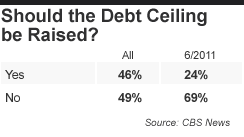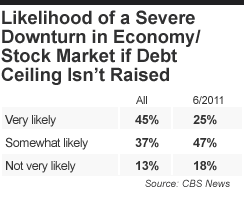Poll: Support for debt ceiling increase doubles
CBS News Poll analysis by the CBS News Polling Unit: Sarah Dutton, Jennifer De Pinto, Fred Backus and Anthony Salvanto.
Americans are now roughly split on raising the debt ceiling, a new CBS News poll shows, with support for an increase nearly doubling since last month.
The spike in support for an increase follows dire warnings from the Obama administration and many economists concerning the consequences of lack of action. They have warned of a possible U.S. default on its obligations, a stock market crash, an increase in interest rates and a halt in Social Security payments and other obligations.
Some Republicans, among them presidential candidate Rep. Michele Bachmann, have deemed such warnings "scare tactics." But the warnings -- and the increased media coverage of the issue -- seem to have prompted many Americans to move from opposing an increase to backing one.
Support for increasing the debt ceiling has risen 22 points from last month, from 24 percent to 46 percent. Opposition has fallen 20 points in that period, from 69 percent to 49 percent. (See graphic at left.)
The poll found that the more one follows the debt ceiling debate, the more likely he or she is to support an increase: 51 percent of those who are following the debate very closely think the debt ceiling should be raised, compared to just 29 percent of those who are not following it closely.
The shift toward more support for an increase can be seen across the political spectrum. Last month, 54 percent of Democrats opposed raising the debt ceiling. Now 61 percent support increasing it. And while a majority of Republicans and independents oppose an increase, it's by a narrower margin than last month. Thirty-three percent of Republicans now say the debt ceiling should be raised, up from 16 percent last month; 40 percent of independents say it should be raised, up from 21 percent last month.
Two thirds of Americans back the Obama administration position that a deal to increase the debt ceiling should include both spending cuts and tax increases, while just 28 percent back the Republican position of only spending cuts. Three in four say an agreement they do not fully support would be preferable to having the U.S. default on its debts.
Expected consequences of inaction: A slim majority of Americans - 51 percent - say they think the United States will "probably not" default on its debts if the debt ceiling is not raised. Thirty-eight percent say the nation will "probably" default without an increase. Republicans and independents are more likely than Democrats to predict that the nation will not default.
The Treasury Department could potentially prioritize paying off U.S. debts before other obligations without an increase in the debt ceiling, avoiding default. But according to the Bipartisan Policy Center, that would mean cutting all other government expenditures - which include military pay and entitlement payments - by 44 percent.
A majority of Americans say it is at least somewhat likely that certain entitlement payments will be stopped without an increase in the debt ceiling; 44 percent say it is not very likely. President Obama warned in an interview with CBS News last week that he could not guarantee that Social Security checks will go out after the August 2 deadline without a deal.
Eight in ten Americans, meanwhile, predict a severe downturn in the economy and stock market without a debt ceiling increase, including 45 percent who say it is very likely. The percentage who says a severe downtown is very likely has risen 20 points since last month. Just 13 percent say a severe downturn is not very likely. (See graphic at left.)
There are skeptics when it comes to the Obama administration's dire warnings, however. Thirty-six percent of Americans - including 51 percent of Republicans - say the administration is making the consequences of not increasing the debt ceiling sound worse than they actually would be. Forty percent say the administration is describing the situation accurately, while 14 percent say it is understating the potential consequences of not acting.
Two thirds of Americans say Republicans and Democrats will probably come to an agreement to raise the debt ceiling by the August 2 deadline. Thirty-one percent say the two sides will probably not reach agreement.
The debt ceiling debate has not improved perceptions of Washington. Twenty-eight percent now say they are angry about the way things are going in the nation's capital, up nine points from May -- and the highest percentage recorded since the question was first asked in early 2010. Another 51 percent say they are dissatisfied with Washington. Just 14 percent call themselves satisfied with how things are going in Washington, and a mere 3 percent say they are enthusiastic.
More from the poll:
Poll: 2/3 back tax hikes in debt deal
Poll: 71% shun GOP handling of debt crisis
This poll was conducted among a random sample of 810 adults nationwide, interviewed by telephone July 15-17, 2011. The error due to sampling for results based on the entire sample could be plus or minus four percentage points. The error for subgroups is higher. This poll release conforms to the Standards of Disclosure of the National Council on Public Polls.

